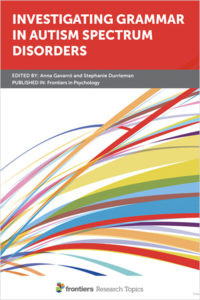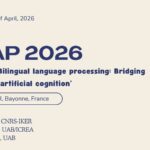6 juny, 2023
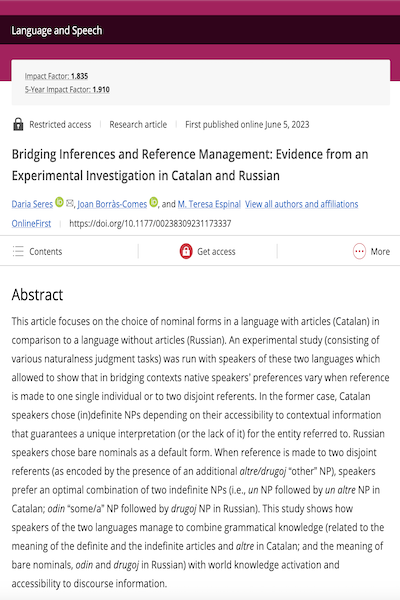
Autors:
Dària Serés, Joan Borràs-Comes & M.Teresa Espinal
Títol:
Bridging Inferences and Reference Management: Evidence from an Experimental Investigation in Catalan and RussianEditorial: Language and Speech (Sage Journals)
Data de publicació: 5 juny, 2023
Més informacióThis article focuses on the choice of nominal forms in a language with articles (Catalan) in comparison to a language without articles (Russian). An experimental study (consisting of various naturalness judgment tasks) was run with speakers of these two languages which allowed to show that in bridging contexts native speakers’ preferences vary when reference is made to one single individual or to two disjoint referents. In the former case, Catalan speakers chose (in)definite NPs depending on their accessibility to contextual information that guarantees a unique interpretation (or the lack of it) for the entity referred to. Russian speakers chose bare nominals as a default form. When reference is made to two disjoint referents (as encoded by the presence of an additional altre/drugoj “other” NP), speakers prefer an optimal combination of two indefinite NPs (i.e., un NP followed by un altre NP in Catalan; odin “some/a” NP followed by drugoj NP in Russian). This study shows how speakers of the two languages manage to combine grammatical knowledge (related to the meaning of the definite and the indefinite articles and altre in Catalan; and the meaning of bare nominals, odin and drugoj in Russian) with world knowledge activation and accessibility to discourse information.
27 febrer, 2023
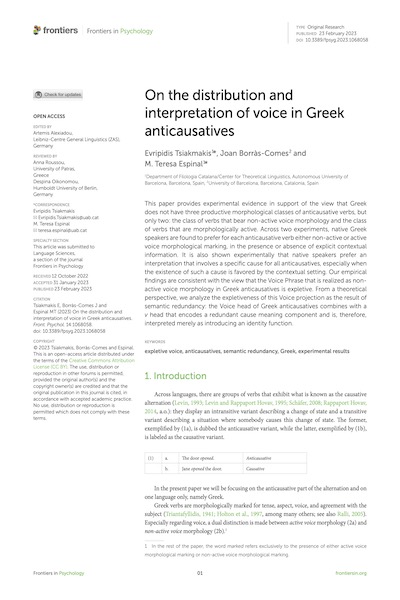
Autors:
Evripidis Tsiakmakis, Joan Borràs-Comes i M.Teresa Espinal
Títol:
On the distribution and interpretation of voice in Greek anticausatives. Frontiers in PsychologyEditorial: Frontiers
Data de publicació: 23 de febrer del 2023
Pàgines: 15 Text completThis paper provides experimental evidence in support of the view that Greek does not have three productive morphological classes of anticausative verbs, but only two: the class of verbs that bear non-active voice morphology and the class of verbs that are morphologically active. Across two experiments, native Greek speakers are found to prefer for each anticausative verb either non-active or active voice morphological marking, in the presence or absence of explicit contextual information. It is also shown experimentally that native speakers prefer an interpretation that involves a specific cause for all anticausatives, especially when the existence of such a cause is favored by the contextual setting. Our empirical findings are consistent with the view that the Voice Phrase that is realized as non-active voice morphology in Greek anticausatives is expletive. From a theoretical perspective, we analyze the expletiveness of this Voice projection as the result of semantic redundancy: the Voice head of Greek anticausatives combines with a v head that encodes a redundant cause meaning component and is, therefore, interpreted merely as introducing an identity function.
3 febrer, 2018
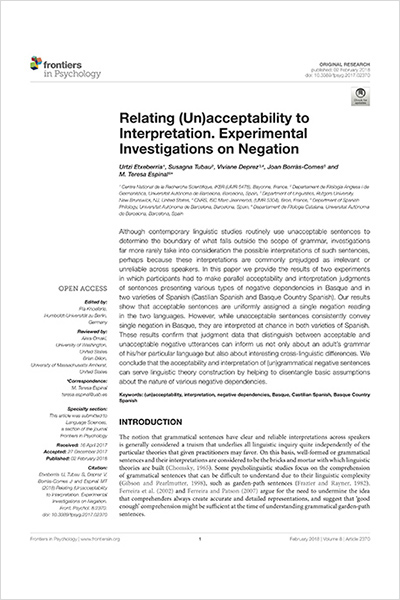
Autors:
Urtzi Etxeberria, Susagna Tubau, Viviane Deprez, Joan Borràs-Comes and M. Teresa Espinal
Títol:
Relating (Un)acceptability to InterpretationEditorial: Frontiers in Psychology
Col·lecció: Frontiers in Psychology #8Data de publicació: 2018
Més informació
Text completAlthough contemporary linguistic studies routinely use unacceptable sentences to determine the boundary of what falls outside the scope of grammar, investigations far more rarely take into consideration the possible interpretations of such sentences, perhaps because these interpretations are commonly prejudged as irrelevant or unreliable across speakers. In this paper we provide the results of two experiments in which participants had to make parallel acceptability and interpretation judgments of sentences presenting various types of negative dependencies in Basque and in two varieties of Spanish (Castilian Spanish and Basque Country Spanish). Our results show that acceptable sentences are uniformly assigned a single negation reading in the two languages. However, while unacceptable sentences consistently convey single negation in Basque, they are interpreted at chance in both varieties of Spanish. These results confirm that judgment data that distinguish between acceptable and unacceptable negative utterances can inform us not only about an adult’s grammar of his/her particular language but also about interesting cross-linguistic differences. We conclude that the acceptability and interpretation of (un)grammatical negative sentences can serve linguistic theory construction by helping to disentangle basic assumptions about the nature of various negative dependencies.
Títols de la col·lecció / Also in this series:
15 agost, 2022
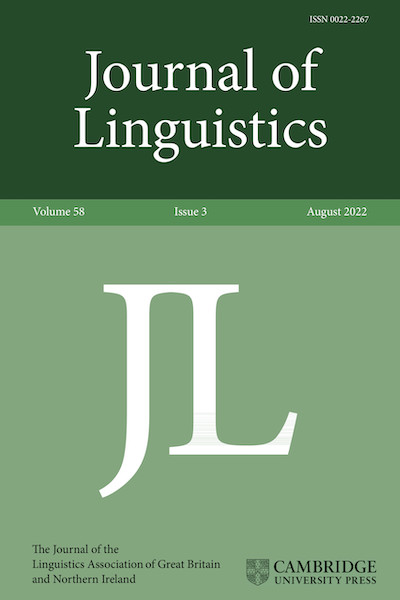
Autors:
M.T. Espinal & Sonia Cyrino
Títol:
A syntactically-driven approach to indefiniteness, specificity and anti-specificityEditorial: Journal of Linguistics 58(3), Cambridge University Press
Data de publicació: Agost 2022
Més informacióIn this paper we present an original approach to analyze the compositionality of indefinite expressions in Romance by investigating the relevance of their syntactic distribution in relation to their meaning. This approach has the advantage of allowing us to explore the question of how syntactic structure can determine the meaning of different forms of indefiniteness. To that end, we postulate a common derivation for bare plurals, bare mass and de phrases, whereby an abstract operator DE is adjoined to definite determiners and shifts entities into property-type expressions. Quantificational specificity is proposed to be derived from a syntactic structure in which weak quantifiers select for indefinite DE-phrases, no matter whether de is overt at Spell-Out or not; these quantifiers turn properties into generalized quantifiers. The anti-specificity meaning of some indefinites is derived by adjoining in the syntactic structure an abstract operator ALG that encodes the speaker’s epistemic state of ignorance to a quantifier encoded for specificity, and it turns a generalized quantifier into a modified generalized quantifier. The paper also brings some general predictions on how indefiniteness is expressed in Romance, as it provides extensive support from five Romance languages: Brazilian Portuguese, Catalan, French, Italian and Spanish.
8 juny, 2022
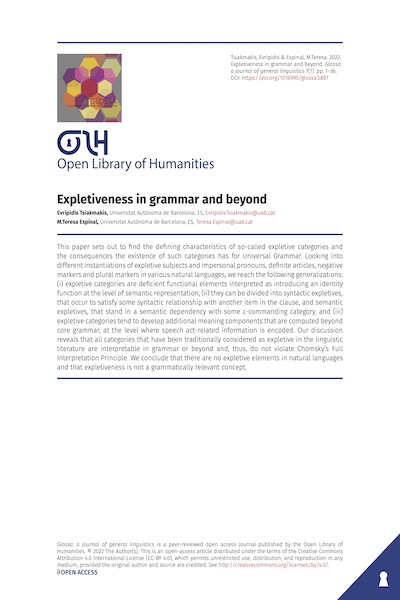
Autors:
Tsiakmakis, E. & M.T. Espinal
Títol:
Expletiveness in grammar and beyondEditorial: Glossa: a journal of general linguistics, 7(1)
Data de publicació: Maig del 2022
Text completThis paper sets out to find the defining characteristics of so-called expletive categories and the consequences the existence of such categories has for Universal Grammar. Looking into different instantiations of expletive subjects and impersonal pronouns, definite articles, negative markers and plural markers in various natural languages, we reach the following generalizations: (i) expletive categories are deficient functional elements interpreted as introducing an identity function at the level of semantic representation, (ii) they can be divided into syntactic expletives, that occur to satisfy some syntactic relationship with another item in the clause, and semantic expletives, that stand in a semantic dependency with some c-commanding category, and (iii) expletive categories tend to develop additional meaning components that are computed beyond core grammar, at the level where speech act-related information is encoded. Our discussion reveals that all categories that have been traditionally considered as expletive in the linguistic literature are interpretable in grammar or beyond and, thus, do not violate Chomsky’s Full Interpretation Principle. We conclude that there are no expletive elements in natural languages and that expletiveness is not a grammatically relevant concept.




